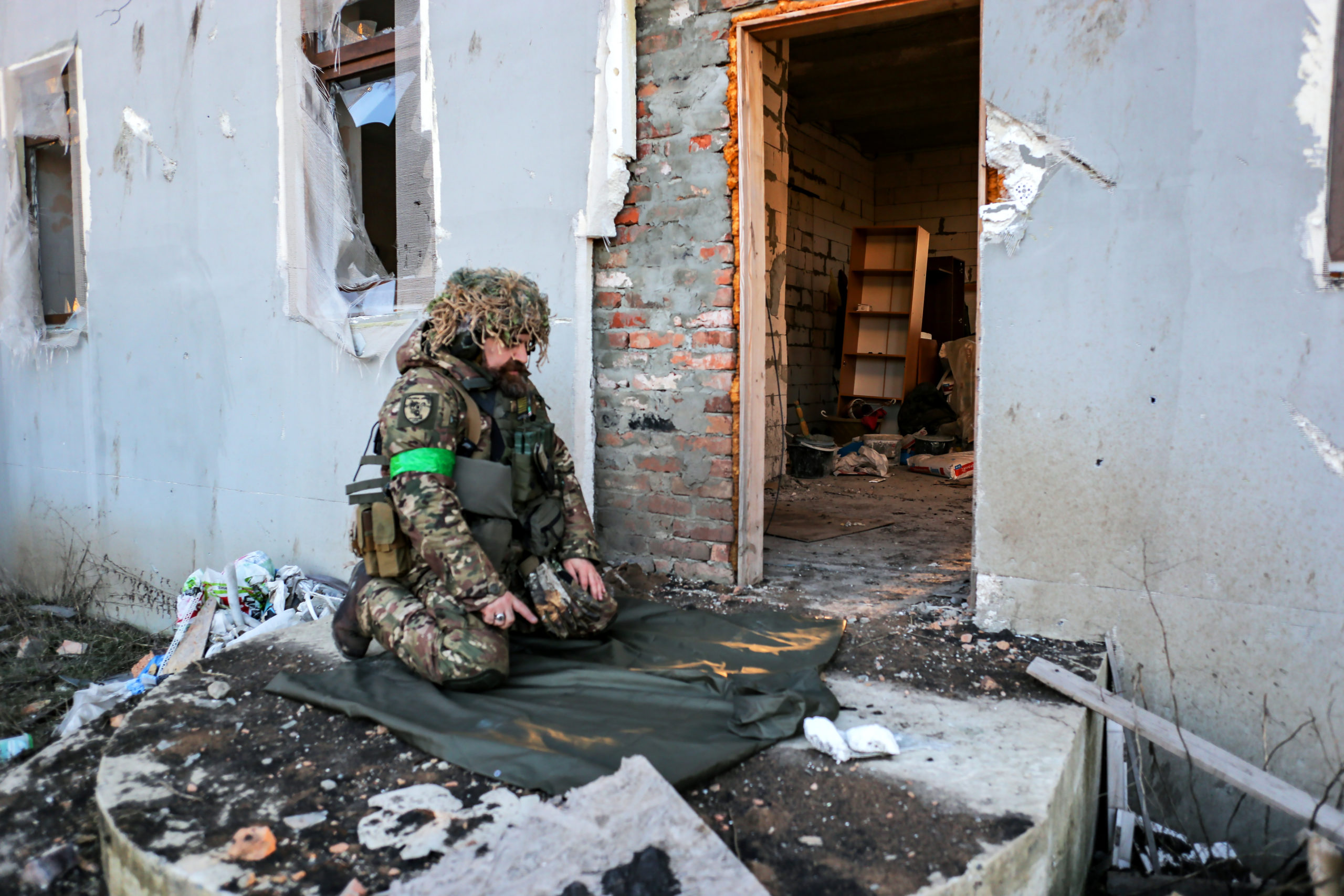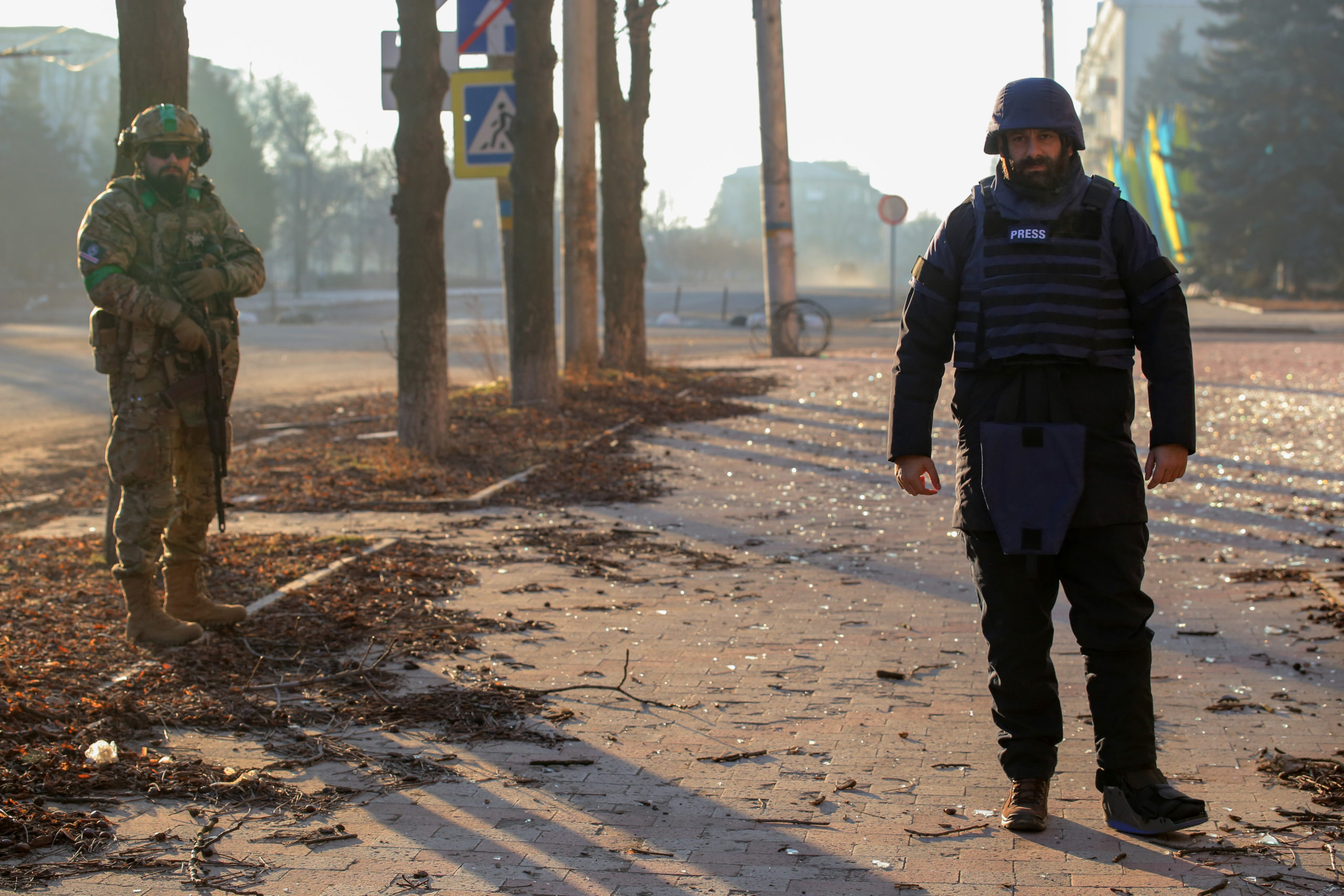Emergency service workers extinguish a fire after shelling on the Bakhmut frontline (Diego Herrera Carcedo/Anadolu Agency via Getty Images)
“The objective for today is to come back alive.” Yevgeny is a young commando from the “Mad Pack”, a special forces unit that has been fighting in Bakhmut since November. His words are familiar — lacquered with that mix of emotions common to almost all soldiers fighting on the frontlines of war: laughter and unease. We clamber into a Land Cruiser and head toward the city. “The situation is always changing,” he continues. “But one thing remains the same: the line of contact is always active.”
Even by the standards of eastern Ukraine, Bakhmut is a hellscape of destruction. Electricity has been out since August and water since October. Rows of uniform Soviet-style buildings now resemble a series of ragged molars, mottled by shells and blackened with soot.
The streets of this city that once had a population of 70,000 are almost empty of civilians, save for the odd elderly man or woman who ambles past amid the constant drum of nearby shelling. Everywhere I look I see soldiers: standing guard, advancing forwards, taking cover, congregating in doorways and behind walls, and almost always smoking. Our first port of call is a mosque. A small squat rectangular box that could be a normal house save for a small golden dome on its roof. Kazbek, a Chechen soldier fighting for Ukraine, who is our guide with Yevgeny, gets out of the car and goes to pray, bowing to Mecca as shells explode around us.

If you want to discover the madness of Russia’s invasion of Ukraine, come to Bakhmut. The battle for the city is now the longest of the war. Russia launched a large offensive to try to take it in July 2022 after it took Severodonetsk, the final major city of the Luhansk region. The truth is Russian troops are dying in their thousands here — and possibly for nothing. The UK Ministry of Defence has outlined Bakhmut’s “limited operational value”: the city’s fall would be useful, but by no means decisive, in helping Russia press further through the Donbas. The fight, therefore, has become almost symbolic. “Bakhmut holds” is now a rallying cry for Ukrainians.
We advance further into the city. I see my first civilian vehicle: a minibus covered in grime, onto which someone has painted a white cross. Then we see an old man walking on the pavement. Yevgeny asks why he hasn’t left. “Where would I go?” he responds. He tells me that he lives with some friends in the city and has a stove and a basement to hide in. We turn a corner, and the Land Cruiser skids across the wet and pitted road. “The full contact front is just there,” says Yevgeny, pointing. Kazbek explains what this means: “The Russians are just 200 metres down that road. Tomorrow, I will come back and kill them.”
Shelling is a constant refrain in Bakhmut. But this close it’s different. Shells whistle around me, deep throaty roars that crescendo to a colossal bang as they strike home. “Now the Russians are attacking Ukrainian positions from three sides,” says Kazbek by way of explanation. We climb back into the Land Cruiser and drive into what appears to be a fenced-off wasteland right by the line of contact. On a wall some graffiti reads, “the republic of Ichkeria [Chechnya] will be free. Russians will be dead.” A lone cyclist comes into view. “Stupid,” says Yevgeny.








Join the discussion
Join like minded readers that support our journalism by becoming a paid subscriber
To join the discussion in the comments, become a paid subscriber.
Join like minded readers that support our journalism, read unlimited articles and enjoy other subscriber-only benefits.
SubscribeWhy are we being regaled with this piece? It has not aged well.
It’s aging like milk
And where is Martin Logan, Martin, say hello, give us a wave
Fully agree. The Russians took Bakhmut ages ago with very little loss of Russian regular soldiers (prisoners and mercenaries) but huge Ukrainian losses. The writer should focus on what is going on in Kiev today – the end of Zelenskys tenure?
Given what we know now, was this piece true when it was originally published?
It’s neocon propaganda. Designed to make you support the war for as long as possible
The main purpose of this article is just to give some perspective from the troops on the ground. I’d say they were actually pretty accurate since the battle was essentially won by May.
Coyote gives me his final assessment. “I think the battle will continue for about one or two months unless there is a major encirclement or something unexpected happens — it will go street by street; the artillery will slowly destroy all the tall buildings and it will [descend to] urban warfare. It will crawl to an end.”
When I read stories like this I feel blessed and grateful for my privileged life – simply by being born in Canada. There is no calamity I could suffer that compares to the misery on the front line.
What is noticeable is not the inaccuracies, it’s the staggering lack of compassion and empathy for ordinary Ukrainians amongst those in the West who are most vociferous in their supposed “support” for Ukraine.
What, exactly, would have been the cost of a peace deal with Russia that would have addressed their very valid concerns on NATO expansion, Crimea (which is more Russian than the Falklands are British) and the atrocities commited on Donbass Russians? And how exactly would it have been worse than the country destroyed, the East lost anyway and hundreds of thousands of young Ukrainians dead?
Absolutely, positively right Samir – answers to those questions should be front and centre in every one of the revisionist takes we’re subjected to now. I’d love to hear Patrikarakos’s thoughts, but I’m sure he’s too busy off Correspondenting to bother coming back with anything, let alone deigning to drop below the line to answer them here.
Ukrainians are fighting and dying not because of Western support, which is enough to fight the war but not to win it.
They are fighting and dying for their country, because of the memory of Holodomor, and because they were invaded. They do not want your phony compassion, they want weaponry.
Why would this article be selected to be one of the “Best Of” it’s a mistery to me. The only possible criteria to qualify it as a “hit” could be the high number of voters from the anti anti-soviet, oops sorry anti-russian crowd, that it got back in February.
First of all, however, it didn’t age well. The current map of the region proves it.Secondly the article was just another biased documentation of what will probably go in history as a totally avoidable war (like many of them are) where tens of thousands of Slavs met their death without glory.
Even biased first-hand accounts are interesting reads and quality journalism. I’d rather this than one of the millions of articles from people sitting comfortably in America giving their take on the situation.
I don’t believe a word of this.
Is it possible that Vladimir Putin is using the Ukrainians as an instrument to exterminate his prison population and thus save himself cost and future trouble?
why the downvote – seems obvious to me that that is exactly what he is intending – killing two birds with one stone – as it were ! dO THE DOWNVOTERS HERE believe that Putin cares at all about casualties ??
Nicely done – meaning, the decision-making that’s doing this to people. They are driven to the point where other humans are just something to exterminate. I can’t see how it can be anything than one of the two things – that killing others either completely mangles your soul(psyche) or you had little soul to mangle. I guess this piece tried to stick to descriptions but the two soldiers described here (not Yevgeny) have no soul left. It’s not just human bodies that are getting destroyed. Humanity is obliterated, as something that fighters on both sides cannot afford to hold on to. As for Nata – her views must help her in her life a fair bit – can’t see her engaging in much wrenching soul-searching. Sorry that I couldn’t keep Captain Obvious from making an appearance.
Some comments are disgraceful – I’m beginning to regret subscribing to Unherd
Such as?